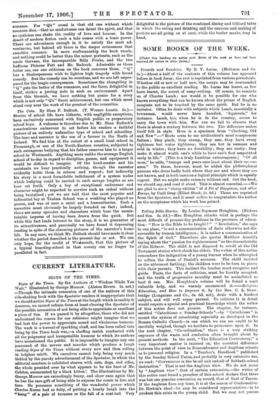The Cubs. By Shan F. Bullock. (T. Werner Laurie. 6s.)—
Stories of school life have hitherto, with negligible exceptions, been exclusively concerned with English public or preparatory school boys. A welcome is therefore due to Mr. Shan Bullock's conscientious endeavour to set before his readers a faithful picture of an entirely unfamiliar type of school and schoolboy. The hero and narrator is the son of a farmer in the North of Ireland. We find him at the outset at a small local school in Fermanagh, or one of the North-Eastern counties, subjected to such outrageous bullying that his father removes him to a larger school in Westmeath. Anything more unlike the average English school of to-day in regard to discipline, games, and equipment it would be difficult to imagine. Of the head-master and his assistants we hear practically nothing, though the narrator evidently holds them in esteem and respect ; but indirectly his story is a most formidable indictment of a system under which bullying could be carried to such savage lengths as are here set forth. Only a boy of exceptional endurance and character might be expected to survive such an ordeal without being brutalised ; yet we are told that the most popular and influential boy at Thalma School was a weakling who played no games, and was at once a saint and a humanitarian. Such a narrative must obviously be largely founded on fact; indeed, there are many episodes and characters which bear the unmis- takable impress of having been drawn from the quick. But while this fact lends interest to the story, it is no guarantee of its attractiveness, and personally we have found it depressing reading in spite of the charming pictures of the narrator's home life. In any case, we think Mr. Bullock should have made it clear whether the period described is the present day or not. We can only hope, for the credit of Westmeath, that this picture of a typical boarding-school in that county can no longer be paralleled in fact.


























































 Previous page
Previous page